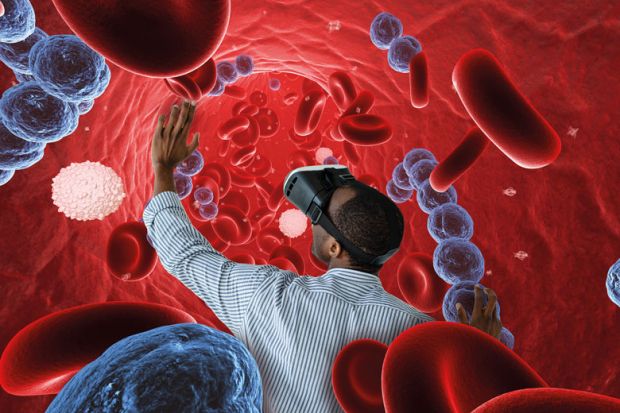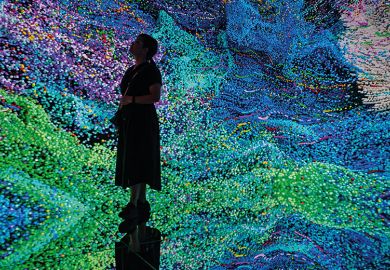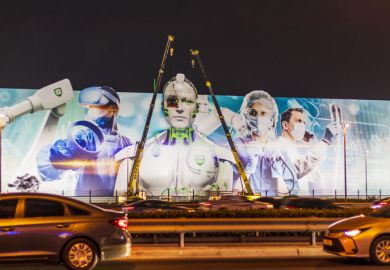Imagine standing inside someone’s intestines or blood stream and helping the body battle bacteria as they flow towards you. It’s one of the ways life sciences students at the University of Glasgow learn about the human body – and it’s much more memorable than reading about it in a textbook or on a flat screen.
At the University of Leeds, medical students are learning to diagnose mental health issues by meeting virtual patients in virtual consultation rooms, while dental students use hand-held instruments that recreate the sense of touch. Researchers there are also investigating ways in which virtual reality can be used to help surgeons “warm up” before their first operations.
Campus resource: Immersive tech in teaching and learning - first steps into the metaverse
During my time in the UK government, I learned the hard way just how fraught the politics of higher education funding can be. But that hasn’t dimmed my belief that universities are one of the UK’s crown jewels. For all the frustrations that come with the bureaucracy and limited resources inherent in university life, especially during periods of economic restraint, I’ve always been impressed with the creativity and drive of the educators and researchers I’ve met.
It may seem an odd comparison, but I’ve found a similar outlook among engineers and product developers in my five years at Meta. Obstacles and restraints aren’t seen as roadblocks but as problems to be solved. Challenging perceived wisdom is encouraged. Dreaming up big ideas, even hopelessly outlandish ones, is the first step in making progress happen.
Despite my years in the somewhat more cynical environment of Westminster, some of that optimism has rubbed off on me. And one of the things I’m most optimistic about is the potential for new technologies to transform education for the better.
There’s a legitimate debate raging about how to integrate online learning into university programmes in the post-pandemic era. Right now, the reality of blended learning is that too often “theory” is delivered via videoconferencing and “practice” in person. But as many universities around the world are demonstrating, metaverse technologies can flip that on its head, immersing students in practical experiences that are often more suited to virtual reality than the teaching of theory. That’s especially true for those that would be dangerous, impossible, counterproductive or expensive in real life – to borrow Stanford academic Jeremy Bailenson’s DICE acronym.
The metaverse is the next evolution of the internet – a more immersive, interactive and 3D experience than the flat screens we use today. It spans a range of technologies, including virtual reality (VR) headsets, augmented reality (AR) glasses that will one day project computer-generated images on to the world around you, and mixed reality (MR) experiences that blend both physical and virtual environments (Meta’s next-generation MR headset, Quest 3, is being launched later this year).
These technologies make you feel like you are right there with another person or in another place – a quality that makes them particularly suitable for education. For most of us, learning is social. We learn from and with others. It’s about interaction and discussion as much as it is about absorbing facts.
If the metaverse promises more engaging ways of learning, advances in generative AI can deliver personalisation for students and more efficient working practices for educators. It will become possible to quickly and easily personalise curriculum materials. By analysing large amounts of data and finding patterns, AI could offer teachers not only detailed information about students’ learning styles, abilities and progress, but also suggestions for how to tailor teaching methods to students’ individual needs.
Educators will also be able to use AI for outsourcing administrative tasks. In time, and with careful training, AI could accurately evaluate essays, tests and other assignments, reducing human error and potential bias in grading.
These technologies are complementary. Generative AI will be a crucial ingredient for building immersive educational experiences. Using AI, a teacher with little coding experience could design a virtual environment to deliver a specific lesson to a specific student. And every student could have their own virtual personal tutor, working with a real-life teacher to provide additional support. Staffordshire University, for example, has recently launched an AI-powered “digital coach” that can provide students with 24-hour support.
Although the technology is new and the research base is still emerging, the early evidence is promising. Studies have found that VR can improve comprehension, knowledge retention, student engagement, attention span and motivation. According to a 2021 study by PwC, 40 per cent of VR learners are more confident in applying what they’ve been taught, and they are 150 per cent more engaged during classes. A survey by the XR Association and the International Society for Technology in Education, meanwhile, found that 77 per cent of educators believe these technologies ignite curiosity and improve engagement.
For these technologies to truly transform higher education, we need to get them into the hands of academics and educators, and we need a much bigger body of research in order to understand exactly how and why they can be deployed to best effect. But the potential is enormous.
Sir Nick Clegg is president of global affairs at Meta.
Register to continue
Why register?
- Registration is free and only takes a moment
- Once registered, you can read 3 articles a month
- Sign up for our newsletter
Subscribe
Or subscribe for unlimited access to:
- Unlimited access to news, views, insights & reviews
- Digital editions
- Digital access to THE’s university and college rankings analysis
Already registered or a current subscriber? Login








